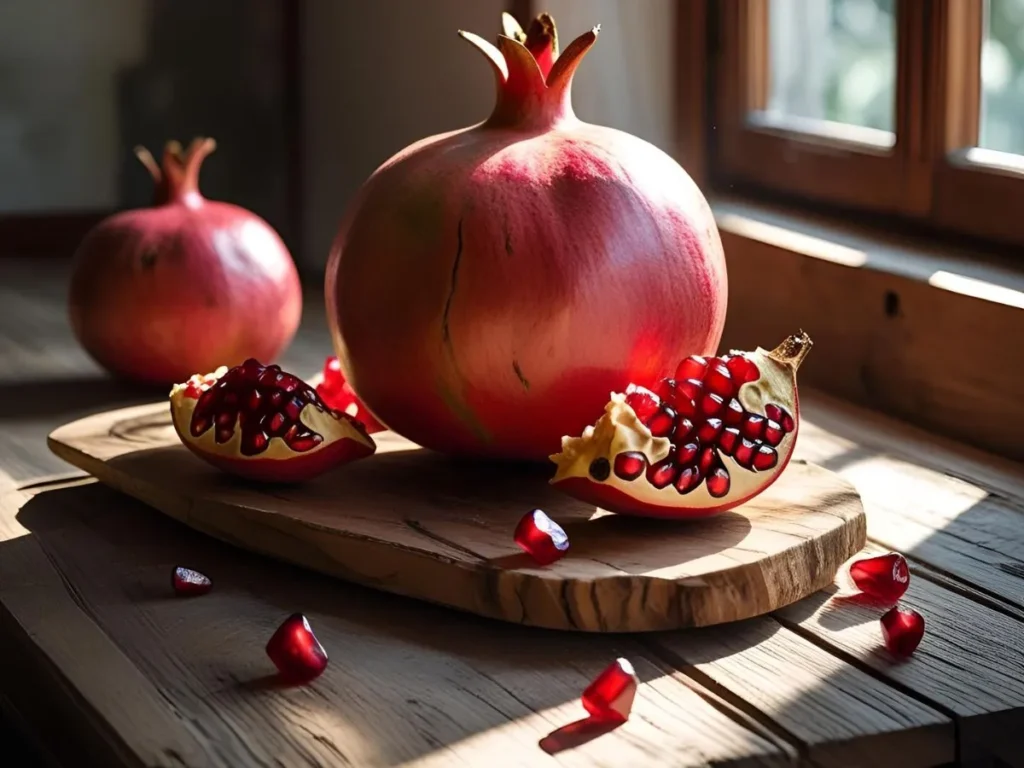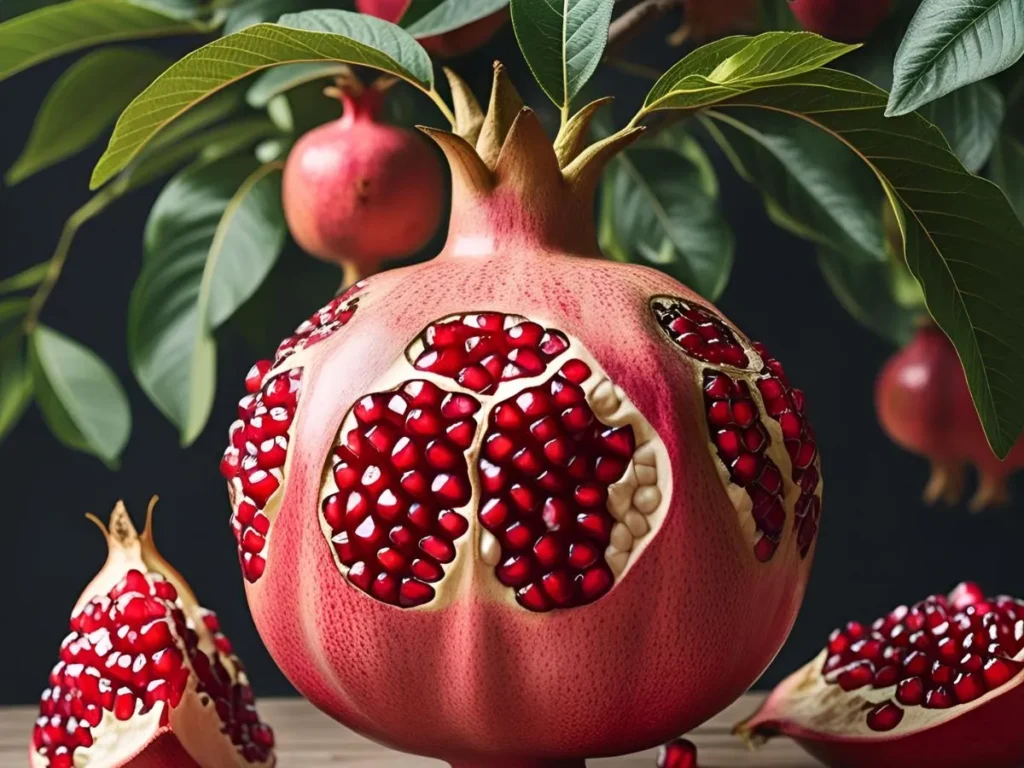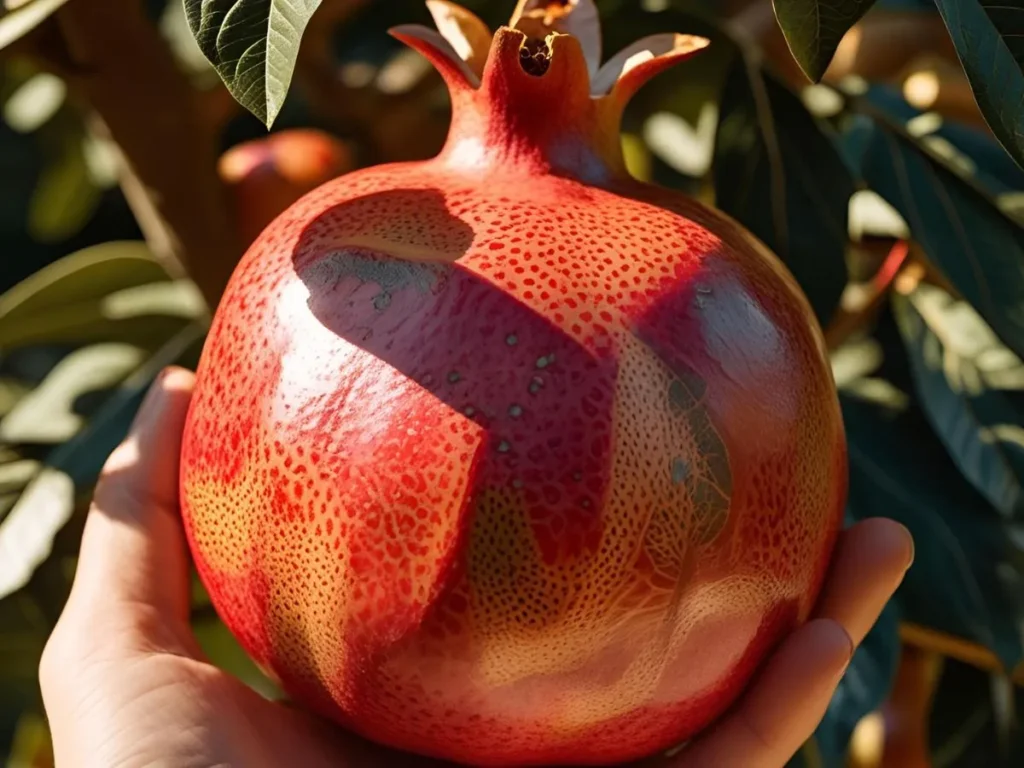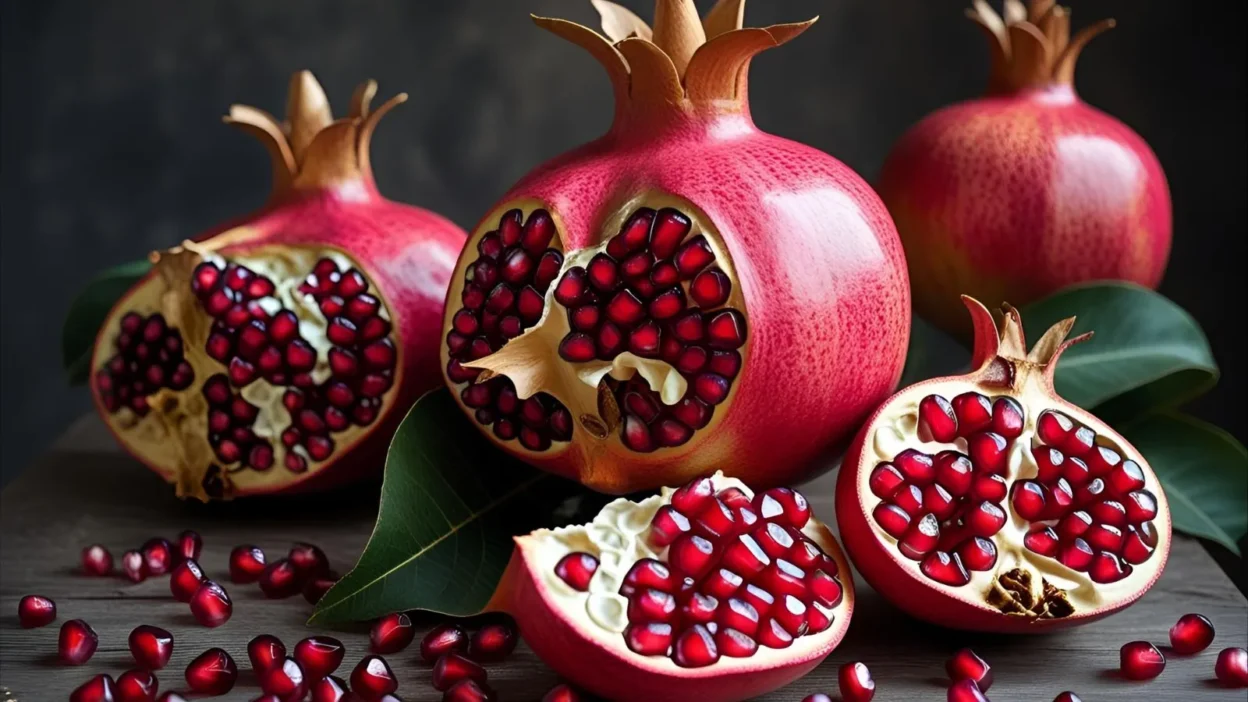Have you ever looked at a pomegranate and felt like there’s something deeper hiding inside it?
More than just seeds—it holds stories, symbols, and sacred meanings from ancient times.
In this article, you’ll discover how the pomegranate connects to love, death, religion, and even your own personal growth.
🌟 Whether you’re curious about its place in Judaism, Christianity, Islam, or its deeper meanings in Greek mythology and art, you’re in the right place.
We’ve also included the latest insights and pomegranate puns for 2025—so you won’t just feel wiser, you’ll feel uplifted too!
Pomegranate Symbolism in Judaism

In Judaism, the pomegranate is a holy fruit. It’s one of the seven species mentioned in the Bible as special to the land of Israel.
Many believe the pomegranate has 613 seeds, which match the 613 commandments (mitzvot) in the Torah.
What it symbolizes:
- Righteousness and faithfulness: Just as the seeds are hidden inside the fruit, your good deeds may be unseen but still count.
- Fruitfulness and wisdom: It appears in temple decorations and on the robes of priests, reminding us to live fully and wisely.
Pomegranates are even eaten on Rosh Hashanah, the Jewish New Year, with a prayer: “May our merits be as numerous as the seeds of a pomegranate.”
Pomegranate Symbolism in Greek Culture
In Greek culture, the pomegranate is a symbol of life, fertility, and renewal.
People break open pomegranates on New Year’s Day for good luck.
The scattered seeds are believed to bring abundance and joy into the home.
The act of smashing the fruit holds deep meaning—breaking the old to invite the new.
It’s a celebration of cycles, family, and hope.
Pomegranate Symbolism in Islam

In Islam, the pomegranate is seen as a fruit of paradise. It’s mentioned in the Qur’an multiple times. Muslims view it as a gift from God, filled with beauty, blessings, and healing.
Symbolism includes:
- Spiritual nourishment
- Gratitude for creation
- Divine wisdom
Pomegranates also remind believers to reflect on the miracles of nature—how something so complex and beautiful could only be created by the Divine.
Pomegranate Symbolism in Christianity
In Christian art and scripture, the pomegranate often symbolizes resurrection and eternal life.
The seeds bursting forth represent Jesus’ resurrection, bringing life after death.
It’s also linked with:
- Unity in faith: Many seeds in one fruit, just like many believers in one church.
- Virgin Mary: Some artworks show her holding a pomegranate, showing purity and sacred motherhood.
The fruit reminds Christians of hope, renewal, and God’s promise of everlasting life.
Pomegranate Symbolism in Greek Mythology
Greek mythology gives the pomegranate a more mystical and emotional twist.
It’s deeply tied to the story of Persephone, the goddess of spring.
When Persephone was taken to the underworld by Hades, she ate six pomegranate seeds.
This act bound her to the underworld for six months every year, causing the seasons to change.
What it means:
- Transformation and cycles: Life isn’t always light—darkness has meaning too.
- Duality: The pomegranate holds both life (seeds) and death (the underworld).
- Mystery of choice: Eating the fruit was a turning point that changed everything.
Pomegranate Symbolism in Art

In art, the pomegranate has been painted, carved, and embroidered for centuries. It’s not just beautiful—it tells a deeper story.
Artists use it to show:
- Hidden beauty: The rough outside hides the glowing seeds inside—just like people.
- Life and death: A ripe pomegranate symbolizes fullness; a split one suggests passing time or mortality.
- Power and femininity: Especially in Renaissance paintings, it’s linked with women, fertility, and sacred beauty.
No matter the style, a pomegranate in art almost always whispers: “There’s more than what you see.”
Persephone and the Pomegranate
This myth deserves its own section. Persephone’s story is more than just a tale—it’s a mirror of our human journey.
Her bite of the pomegranate was both a curse and a blessing.
She became Queen of the Underworld, but also goddess of spring. She learned that darkness can grow you, not destroy you.
The seeds she ate weren’t just food—they were a spiritual contract. They symbolize:
- Becoming who you’re meant to be
- Accepting the full cycle of life
- Making peace with sorrow
Her story teaches us that even in shadow, beauty can bloom again.
Pomegranate Symbolism and Love
Pomegranates are powerful symbols of deep, passionate, spiritual love. Not the kind of love that comes and goes—but the kind that roots itself in your soul.
Why it represents love:
- Many seeds: Endless feelings, endless possibilities.
- Red juice: Like the heart, rich and full of life.
- Ancient rituals: Used in weddings and love offerings in many cultures.
In relationships, the pomegranate reminds us that true love holds sweetness and sacrifice—it nourishes you, but it asks for your care and patience too.
Pomegranate Symbolism and Death
As strange as it sounds, this fruit is also tied to death—but in a comforting way. Not as an ending, but as a transition.
Its tough outer skin and hidden seeds reflect:
- The unseen life after death
- The soul’s journey beyond the body
- The belief that death can bring renewal
Just as a pomegranate bursts open to show its beauty, death can reveal spiritual truths we couldn’t see before.
Real-Life Scenarios: Pomegranate Moments
🌸 1. A Wedding Blessing
At a Turkish wedding, a bride throws a pomegranate on the ground. The number of seeds that fall out is said to predict how many children she’ll have. It’s more than a tradition—it’s a moment of hope and fruitfulness.
🌑 2. A Personal Grief Ritual
After losing her father, Maria planted a pomegranate tree in his memory. Each year, when it blooms, she says, “He’s still growing with me.” The fruit has become her symbol of healing.
🌿 3. A Spiritual Awakening
Liam was gifted a pomegranate by a stranger during a difficult time. He didn’t know why, but he kept the fruit on his altar. Later, he said, “It became my symbol of new beginnings and hidden strength.”
FAQs About Pomegranate Symbolism
1. Why does the pomegranate show up in so many religions?
Because of its deep visual beauty and countless seeds, it naturally became a symbol of abundance, life, and sacredness across cultures.
2. What does the pomegranate mean spiritually?
It often represents hidden wisdom, spiritual rebirth, and the soul’s journey.
3. How is the pomegranate used in rituals?
It’s used in blessings, weddings, funerals, and art to mark transitions and sacred moments.
4. Is the pomegranate lucky?
Yes! In many cultures, breaking or eating a pomegranate invites blessings, fertility, and good fortune.
5. Can I use the pomegranate as a personal symbol?
Absolutely. If it speaks to your heart, let it be a sign of your growth, love, or spiritual rebirth.
Conclusion:
The pomegranate is more than just a fruit. It’s a spiritual teacher in disguise. It tells you that life is complex—but every seed has a purpose.
That love can be sacred. That death can be a doorway. That even in the messiest moments, beauty waits to be found.
So the next time you hold a pomegranate, pause.
Listen.
Feel.
Let it remind you: You are full of seeds. You are full of life. And your story is still unfolding.




